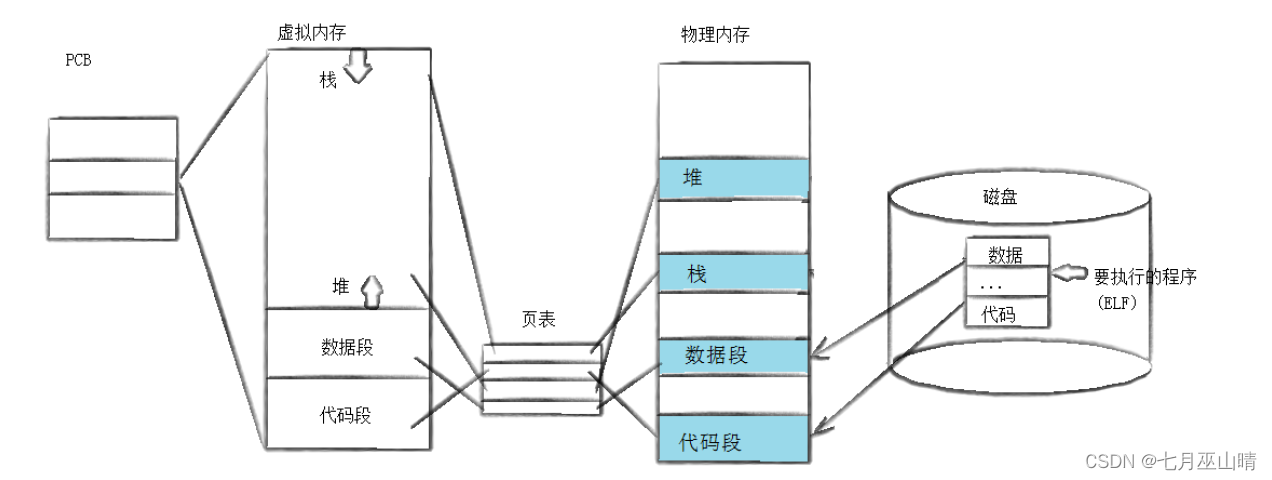进程的程序替换(exec函数)【Linux】
进程的程序替换详解exec函数【Linux】
程序替换的原理
??进程的程序替换就是让子进程执行新程序, 执行全新的代码和数据,不再和父进程有瓜葛。
替换原理
??用fork创建子进程后执行的是和父进程相同的程序(但有可能执行不同的代码分支),子进程往往要调用一种exec函数以执行另一个程序。当进程调用一种exec函数时,该进程的用户空间代码数据完全被新程序替换,从新程序的启动例程开始执行。调用exec并不创建新进程,所以调用exec前后该进程的id并未改变。
- 也就是说程序替换的作用是为了完成一些特定的任务,需要去执行其他的程序。
- 使用exec系列函数可以达到程序替换的目的。
- 程序替换会重新创建虚拟地址,页表,然后将磁盘中的文件加载进物理内存。
- 程序替换会自动释放原来的进程虚拟内存和页表。
- 程序替换时, 虚拟地址空间和页表的映射会变化,PCB里的优先级等信息不变。
exec系列函数
??以下函数的参数末尾都一定需要带上一个==“NULL”==。
#include <unistd.h>
// path是要替换的程序文件路径+文件名,main函数的argv参数中是什么,这里就怎么写。
int execl(const char *path, const char *arg, ...);
// 会自动到环境变量PATH中根据file寻找新程序的文件,所以file可以直接写成文件名即可。
int execlp(const char *file, const char *arg, ...);
// 自己可以维护环境变量
int execle(const char *path, const char *arg, ...,char *const envp[]);
// 将命令装入数组中,下面的三个函数其余的跟上面的三个函数都是一样的。
int execv(const char *path, char *const argv[]);
int execvp(const char *file, char *const argv[]);
int execve(const char *path, char *const argv[], char *const envp[]);
函数理解
- 这些函数执行成功的话,则加载进新的程序,启动新程序并且从新程序的的开头开始执行,不再返回。
- 如果执行成功,原程序中的后续代码将不再执行,因为eip(程序计数器),已经改变到新程序处。
- 如果调用出错则返回-1.
- 所以exec只有出错的返回值没有成功的返回。毕竟成功的返回值是无意义的。
- 除了系统文件,也可以替换成自定义文件,如: .sh,python,java都可以调用。
命令理解(助记)
-
l(list) : 表示参数采用列表
-
v(vector) : 参数用数组
-
p(path) : 有p自动搜索环境变量PATH
-
e(env) : 表示自己维护环境变量

关于程序替换中环境变量的解释
- 当进行程序替换时,子进程对应的原始环境变量是从父进程中来的,bash拥有最原始的环境变量,后代进程可在其基础上添加并继承自己的父进程的环境变量。
- 环境变量被继承是一种默认行为,不受程序替换的影响。(程序替换只替换代码和数据,不替换环境变量)因为创建子进程都以父进程为模板,父子进程的环境变量指向同一块物理地址,所以一样。
- 如何让子进程获得环境变量。
- 将父进程的环境变量原封不动的传递给子进程(1. 直接用。 2. 直接传)。
- 想传递自己的环境变量,可以直接构建环境变量表,给子进程传递(是覆盖原来环境变量式的传递)
- 新增传递(可以利用putenv()函数)。
exec函数之间的关系
??事实上,只有execve是真正的系统调用,其它五个函数最终都调用 execve,所以execve, man手册 第2节,其它函数在man手册第3节。这些函数之间的关系如下图所示。
下图exec函数族 一个完整的例子:

exec函数的使用
execl
int execl(const char *path, const char *arg, ...);
// test.cpp:
#include <iostream>
#include <unistd.h>
int main()
{
pid_t fd = fork();
if (fd == 0)
{
// child
execl("/root/Y23_12_28/t", "t", "-start", NULL);
}
return 0;
}
#include <stdio.h>
int main(int argc, char *argv[])
{
printf("%s %s\n", argv[0], argv[1]);
printf("我是t.cpp进程\n");
return 0;
}

execlp
int execlp(const char *file, const char *arg, ...);
此时我们打印环境变量PATH:
#include <stdio.h>
#include <unistd.h>
#include <cstdlib>
int main(int argc, char *argv[])
{
printf("%s", getenv("PATH"));
return 0;
}

打印当前的文件路径cwd:

??对比会发现PATH中没有cwd,若是直接使用execlp的话一定会报错。我们来试一下:
#include <stdio.h>
#include <unistd.h>
int main()
{
pid_t fd = fork();
if (fd == 0)
{
// child
int ret = execlp("t", "t", "-start", NULL);
if (ret < 0)
{
printf("execpl错误\n");
}
}
return 0;
}

??果然报错了,原因是PATH中没有cwd,无法自动找到文件位置。所以我们需要添加环境变量,使用putenv()函数,使用这个函数需要注意的是,会将原来的PATH内容全部清除,然后再添加新的PATH。
//test.cpp:
#include <stdio.h>
#include <unistd.h>
#include <cstdlib>
int main()
{
pid_t fd = fork();
if (fd == 0)
{
char *old_PATH = getenv("PATH");
char new_PATH[] = ":/root/Y23_12_28";
char new1[1000];
sprintf(new1, "PATH=%s%s", old_PATH, new_PATH);
putenv(new1);
// child
int ret = execlp("t", "t", "-start", NULL);
if (ret < 0)
{
printf("execpl错误\n");
}
}
return 0;
}
//t.cpp:
#include <stdio.h>
#include <cstdlib>
#include <unistd.h>
#include <string.h>
int main(int argc, char *argv[])
{
printf("%s %s\n", argv[0], argv[1]);
printf("我是t.cpp进程\n");
return 0;
}
??这里有一个需要注意的地方,就是合并新老PATH时,一定不要忘记PATH=%s%s的PATH=

execle
int execle(const char *path, const char *arg, ...,char *const envp[]);
??多出来的这个e表明了可以自己设定环境变量:
// test.cpp
#include <stdio.h>
#include <unistd.h>
#include <cstdlib>
int main()
{
pid_t fd = fork();
if (fd == 0)
{
char *const envp[] = {"PATH=/root/Y23_12_28", "NULL"};
// child
int ret = execle("t", "t", "-start", NULL);
if (ret < 0)
{
printf("execpl错误\n");
}
}
return 0;
}

execv
int execv(const char *path, char *const argv[]);
??v表示使用数组来装载命令, 而不是vector;
#include <stdio.h>
#include <unistd.h>
#include <cstdlib>
int main()
{
pid_t fd = fork();
if (fd == 0)
{
// child
char *arg[3] = {"t", "-start", "NULL"};
int ret = execv("/root/Y23_12_28/t", arg);
if (ret < 0)
{
printf("execpl错误\n");
}
}
return 0;
}

??至于execvp和execve在这里就不过多赘述了。
????😄 创作不易,你的点赞和关注都是对我莫大的鼓励,再次感谢您的观看😄
本文来自互联网用户投稿,该文观点仅代表作者本人,不代表本站立场。本站仅提供信息存储空间服务,不拥有所有权,不承担相关法律责任。 如若内容造成侵权/违法违规/事实不符,请联系我的编程经验分享网邮箱:chenni525@qq.com进行投诉反馈,一经查实,立即删除!
- Python教程
- 深入理解 MySQL 中的 HAVING 关键字和聚合函数
- Qt之QChar编码(1)
- MyBatis入门基础篇
- 用Python脚本实现FFmpeg批量转换
- 【计算机408学习笔记】C语言(初级) 2023-12-26
- 葡萄酒的主要区别只在于葡萄本身吗?
- 安装、运行和控制AI apps在您的计算机上一键式
- 拓展操作(四) 使用nginx反向代理jenkins
- 【卡梅德生物】几种蛋白表达系统的比较
- 多门店在线预约小程序源码系统+在线预约+在线支付+到店付款 +完整的代码包 带搭建教程
- 计算机毕业设计 | SpringBoot+vue农产品商城 买菜购物网站(附源码)
- QT+OSG/osgEarth编译之六十六:dae+Qt编译(一套代码、一套框架,跨平台编译,版本:OSG-3.6.5插件库osgdb_dae)
- CSDN 年度总结|知识改变命运,学习成就未来
- 如何使用 templ 在 Go 中编写 HTML 用户界面?
